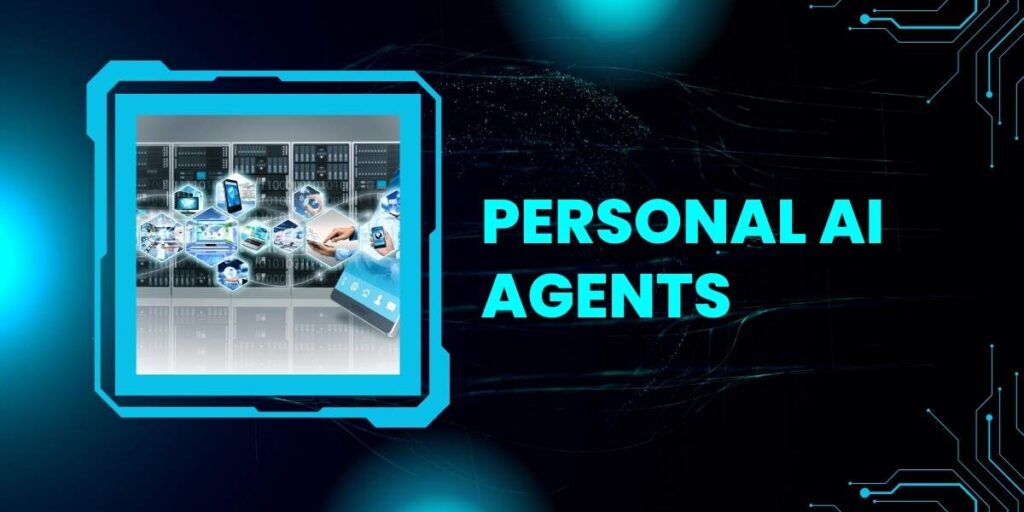Artificial intelligence has quietly woven itself into nearly every aspect of our routine—whether it’s using voice assistants like Siri or Alexa to set reminders, or relying on recommendation algorithms that guide us toward the next show to watch or product to purchase. But technology is now moving into a more advanced phase with the rise of personal AI agents. Unlike traditional assistants that simply execute tasks, these agents act as intelligent digital companions capable of continuously learning, adapting behaviors, and managing complex parts of both a person’s online and offline world.
With rapid progress in machine learning, natural language processing, and predictive analytics, personal AI agents are becoming increasingly powerful. They bring together conversation skills, decision-making abilities, and contextual awareness in ways that were not possible just a few years ago. As we move further into 2025, these agents are expected to transform how people manage daily activities, optimize productivity, and even make smarter life choices by anticipating needs before they are clearly expressed.
This blog takes a closer look at what defines personal AI agents, the standout features that make them unique, the leading solutions to watch in 2025, their everyday uses, potential challenges, and how they may shape our digital future.
What Are Personal AI Agents?
A personal AI agent can be described as a highly intelligent digital system designed to operate as an individual’s trusted companion in the virtual space. Unlike general-purpose AI tools that are built to serve a wide audience, these agents are crafted and fine-tuned for a single user, learning from their daily routines, personal preferences, and long-term goals to offer support that feels personalized and highly relevant.
What sets personal AI agents apart is their proactive nature. Instead of simply responding to commands or questions, they are capable of anticipating needs, providing meaningful suggestions, and in many cases independently carrying out tasks in the background. Consider a few practical examples:
- Managing daily schedules through smart coordination of meetings, reminders, and calendar events.
- Offering healthier lifestyle suggestions based on sleep data, activity tracking, or diet patterns.
- Organizing and summarizing unread emails, while flagging those that require urgent attention.
- Researching and planning trips by aligning destination options with personal budgets and preferences.
- Acting as a coach or motivational guide in areas such as learning, fitness, mental wellness, and productivity.
The key distinction between personal AI agents and traditional digital assistants lies in the depth of personalization. While standard assistants merely carry out instructions, personal AI agents evolve continuously, adapting to the user with each interaction. Over time, they shift from being task executors to intelligent partners that can intuitively support and enhance decision-making across many aspects of life.
Also Read – Finance AI Agents
Key Features of Personal AI Agents
To be recognized as genuine personal AI agents, these systems must go beyond basic automation and display several distinctive capabilities that set them apart from ordinary digital tools or assistants. At their core, they are characterized by adaptability, intelligence, and a high degree of personalization, all working together to create a seamless user experience. Unlike generic AI models, which function the same way for every individual, personal AI agents evolve with continuous use, becoming smarter and more attuned to their user’s unique lifestyle, priorities, and habits.
- Personalization
Modern digital companions learn from each individual they serve. Over time, they recognize personal habits, preferred communication styles, and unique goals, shaping their responses to feel specifically tailored to the user. This evolving familiarity makes the interaction feel natural and personal, creating the sense of having a smart partner who understands you rather than a generic tool executing commands.
- Context Awareness
Instead of functioning in isolation, these systems pay attention to context. They note details such as the time of day, current location, ongoing activities, and even subtle behavioral cues. By weaving these factors together, they provide support that is both timely and meaningful. This situational intelligence ensures suggestions or reminders feel relevant and seamlessly aligned with real-world needs.
- Autonomy
True digital agents act with a level of independence. Rather than waiting for constant prompts, they handle responsibilities on their own, such as booking appointments, setting timely reminders, or adjusting schedules. This hands-off functionality gives users freedom from micromanaging tasks and provides peace of mind that routine duties are being taken care of automatically.
- Conversational Intelligence
One of their strongest traits is the ability to communicate in a way that feels genuinely human. They can interpret tone, intent, and nuance, whether through voice or text, creating easy and engaging conversations. This makes interactions convenient and enjoyable while reducing the mechanical nature often associated with older digital assistants.
- Integration with Ecosystems
A powerful feature is their ability to link with multiple devices and services at once. They work seamlessly across calendars, emails, smart home tools, and productivity platforms, creating smooth coordination between environments. By bridging isolated systems, they remove friction and allow users to manage tasks without hopping between apps and platforms.
- Predictive Capabilities
By studying patterns and learning from past behaviors, these companions can anticipate needs before the user even voices them. For example, they may suggest leaving early for a meeting because of traffic, remind someone to stay hydrated on busy days, or recommend downtime after long work hours. This forward-looking ability shifts them from reactive helpers to proactive partners.
- Security and Privacy Controls
Because these agents often handle deeply personal information, strong protection is essential. They come equipped with encryption, customizable privacy settings, and clear data-handling practices, ensuring users remain in control of what is shared. This commitment to safety builds trust, which is critical when relying on a digital system to manage sensitive aspects of life.
Taken together, these features transform such systems into more than ordinary assistants. They grow into highly capable partners—learning continuously, supporting seamlessly, and respecting the boundaries of personal information.
Top 10 Personal AI Agents for 2025
By 2025, several standout personal AI agents are making waves for their advanced features, widespread use, and innovative approaches to improving everyday life:
- ChatGPT (Custom Versions)
OpenAI’s customizable agents allow users to tailor their capabilities to individual needs, from managing schedules and writing assistance to organizing knowledge efficiently. - Anthropic’s Claude AI
Praised for prioritizing safety alongside productivity, Claude delivers a balanced mix of helpfulness and natural, intelligent conversation. - Pi (Inflection AI)
Designed with empathy and context-awareness at its core, Pi offers supportive and understanding interactions suited for daily use. - xAI’s Grok (integrated with X)
Specializing in social media and real-time information, Grok blends entertainment with productivity, creating a dynamic personal assistant experience. - Microsoft Copilot (Personal Edition)
Embedded within Office 365 and Windows, Copilot acts as a capable assistant for professionals, helping streamline emails, documents, and presentations. - Google Gemini Personal
Google’s advanced AI agent integrates smoothly with Gmail, Calendar, and Android devices for effortless life organization. - Replika AI (Advanced 2025 Edition)
Aimed at mental wellness and personal growth, Replika provides compassionate, human-like companionship and emotional support. - Character AI (Personal Companion Mode)
Offers flexible AI characters that serve as creative collaborators, life coaches, or friendly companions tailored to user preferences. - Personal AI (startup offering)
Focuses on creating secure, private AI models built directly from an individual’s personal data for truly unique and customized experiences. - Apple’s Personal Siri (2025 Update)
Apple’s renewed Siri integrates advanced generative AI features while maintaining a strong commitment to privacy, operating efficiently on iPhone and Mac devices.
This diverse lineup showcases how personal AI agents are evolving to cover wide-ranging roles—from boosting productivity and aiding creativity to offering emotional support and managing daily routines with sophistication and ease.
Real-World Uses of Personal Digital Helpers
Personal digital helpers have become part of everyday routines, assisting people with a wide variety of tasks across many areas of life:
- Boosting Productivity and Managing Time
These helpers organize calendars, sort tasks by importance, and send timely nudges about deadlines. They can even adjust schedules automatically if meeting conflicts occur, making it simpler to stay on track.
- Support for Learning and Education
Whether a student or lifelong learner, users get support that adjusts to their own pace and style. These helpers offer customized lessons, practice questions, and easy-to-understand explanations to make learning more approachable.
- Health and Well-Being
They monitor fitness routines, suggest exercises, and keep tabs on sleep habits. Many also encourage mindfulness and help users manage stress by offering timely reminders or calming prompts.
- Handling Finances
By keeping an eye on spending habits, these helpers guide budgeting efforts, issue alerts on upcoming bills, and spot unusual charges to help protect user finances.
- Travel and Lifestyle Planning
Travel arrangements become easier with personalized suggestions on destinations, booking flights and accommodations while considering budget and preferences, removing much of the usual hassle.
- Smart Home Management
Connected to devices at home, these helpers adjust lighting, temperature, and security settings, tailoring the environment to daily routines and making life more comfortable and safe.
- Creative Brainstorming
Artists, writers, and designers use these helpers to spark ideas, organize concepts, and create rough drafts, providing valuable support during creative processes.
- Staying Connected Socially
They keep track of important dates like birthdays, help compose thoughtful messages, and offer conversation ideas, helping users nurture their social relationships.
Thanks to their ability to adjust and learn over time, these helpers are becoming trusted companions that make everyday activities easier and better suited to individual lifestyles.
Challenges and Limitations
Despite their promising benefits, personal digital helpers face several key challenges:
- Privacy Concerns
These helpers manage sensitive personal details, so any misuse or security breaches could have serious effects, making privacy protection a top priority.
- Overreliance
Depending too much on these systems may weaken people’s drive to take initiative or think critically, which might affect independent decision-making skills over time.
- Bias and Errors
Since these helpers learn from existing data and user behavior, they can sometimes reflect existing prejudices or make mistakes, resulting in inaccurate advice or faulty actions.
- Cost and Accessibility
Advanced features and premium versions can be expensive, restricting access for many people and creating a divide in who benefits from this technology.
- Ethical Questions
The growing role of digital helpers in making choices, influencing emotions, or acting autonomously raises important concerns about responsibility, control, and the boundaries between humans and technology.
- Compatibility Problems
Many of these helpers work best within certain platforms or ecosystems, which can limit their usefulness for people using different types of devices or software.
While these issues are significant, ongoing technical improvements, thoughtful policies, and responsible design approaches are expected to address many of them, enabling safer and more fair use in the near future.
Future of Personal Digital Helpers
The outlook for personal digital helpers is both promising and poised to bring significant transformations in how people manage their lives and engage with technology. Key trends expected to drive their evolution include:
- Hyper-Personalization: These systems will become more deeply customized, forming extensive knowledge about individuals’ habits, preferences, and routines to provide highly tailored assistance.
- Multimodal Interaction: Beyond simple text or voice communication, future helpers will incorporate images, videos, and information from real-world sensors to create richer, more intuitive interactions.
- Greater Independence: Digital helpers will not only offer suggestions but will also handle complex, multi-step tasks on their own, requiring little input from users.
- Improved Privacy Safeguards: Processing data directly on devices and encrypting personal information will significantly enhance privacy protections, giving users greater control.
- Emotional Sensitivity: Future systems will better recognize human emotions and respond with empathy, providing support that feels warmer and more natural.
- Cross-Platform Compatibility: These helpers will smoothly operate across various devices and environments—from mobile phones to cars and wearable technology—ensuring a consistent and connected user experience.
By 2030, personal digital helpers may become as essential and widespread as smartphones are today, revolutionizing the way people interact with technology and manage their daily routines with greater ease and intelligence.
Conclusion
Personal digital helpers mark a major advancement in how people connect with technology. They go far beyond simple assistants and evolve into collaborative digital partners that can boost productivity, support health, spark creativity, and aid in better decision-making.
Although issues like privacy, affordability, and ethical considerations still need to be addressed, the overall path suggests these helpers will become essential companions in daily life. Early adopters stand to gain increased efficiency and a more enriched digital experience.
At the same time, their rise invites important discussions about autonomy, trust, and the evolving relationship between humans and technology, highlighting the need for thoughtful use and responsible development as these tools become more intertwined with everyday living.
Frequently Asked Questions
Q1. What is a personal assistant?
Ans:- A personal assistant is a resource that helps you manage daily tasks and appointments, adjusts to your preferences, and supports keeping your routine organized and manageable.
Q2. How does a personal assistant differ from a basic helper?
Ans:- Unlike a basic helper who only follows direct instructions, a personal assistant pays attention to your habits and tries to anticipate your needs, often offering helpful reminders or suggestions in advance.
Q3. Can personal assistants offer help without relying on internet access?
Ans:- Some personal assistants or tools can effectively provide support without requiring an internet connection by working directly with the resources or methods available to you.
Q4. Are personal assistants reliable and secure?
Ans:- When chosen carefully and used thoughtfully, personal assistants offer dependable support. It’s important to handle personal information carefully and work with assistants or tools that respect privacy.
Q5. Do personal assistants make important decisions for me?
Ans:- Personal assistants provide guidance and support but leave critical decisions entirely up to you.
Q6. What costs are commonly associated with personal assistance?
Ans:- Costs vary widely depending on the type of support—from informal assistance by friends or family to paid services specializing in task management or organization. Many affordable options also exist for daily planning help.
Q7. Who typically benefits most from having a personal assistant?
Ans:- People with busy schedules—such as students, professionals, caregivers, and artists—find personal assistants particularly valuable for managing responsibilities and making the most of their time.




